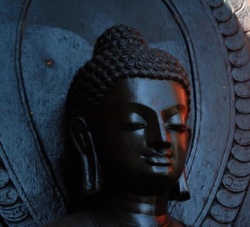Difference between revisions of "Parinirvāṇa"
Jump to navigation
Jump to search
m (Text replacement - "The Buddha" to "The Buddha") |
|||
| Line 1: | Line 1: | ||
[[File:024 n.jpg|thumb|250px|]] | [[File:024 n.jpg|thumb|250px|]] | ||
| − | '''Parinirvāṇa'''; That which is beyond (para) [[Nirvāṇa]]. The [[Buddha]] was said to have attained [[Nirvāṇa]] under the [[Bodhi tree]], and parinirvāṇa when he | + | '''[[Parinirvāṇa]]'''; That which is beyond (para) [[Nirvāṇa]]. The [[Buddha]] was said to have [[attained]] [[Nirvāṇa]] under the [[Bodhi tree]], and [[parinirvāṇa]] when he “[[died]]”, thus complete [[extinction]] of or release from all [[Attachment]] to the [[Form]]. In technical [[Buddhism]] it refers to complete [[cessation]], non-residual [[Nirvāṇa]], the passing away of [[Buddhas]]. |
| + | |||
| + | [[Parinirvāṇa]] ([[yongs su mya ngan las 'das]]) | ||
| + | *The expression "[[final nirvāṇa]]" (Skt. [[parinirvāṇa]]) refers specifically to the passing away of [[buddhas]], such as [[Śākyamuni]], and it is considered to be the last of the twelve [[principal]] [[deeds]] demonstrated by the [[buddha-body]] of [[emanation]], exemplified by the [[death]] of [[Śākyamuni]] at [[Kuśinigara]]. In [[general]], [[nirvāṇa]] is the state of total [[cessation]] of all [[sufferings]], [[dissonant mental states]] and also of the [[psychological]] tendencies and imprints which [[cause]] our [[dualistic]] [[perceptions]] and lead [[sentient beings]] to a state of {{Wiki|confusion}} within [[cyclic existence]]. | ||
| + | |||
| + | See also under; [[nirvāṇa]]. | ||
See also: [[Parinirvana]] | See also: [[Parinirvana]] | ||
Revision as of 13:45, 15 March 2014
Parinirvāṇa; That which is beyond (para) Nirvāṇa. The Buddha was said to have attained Nirvāṇa under the Bodhi tree, and parinirvāṇa when he “died”, thus complete extinction of or release from all Attachment to the Form. In technical Buddhism it refers to complete cessation, non-residual Nirvāṇa, the passing away of Buddhas.
Parinirvāṇa (yongs su mya ngan las 'das)
- The expression "final nirvāṇa" (Skt. parinirvāṇa) refers specifically to the passing away of buddhas, such as Śākyamuni, and it is considered to be the last of the twelve principal deeds demonstrated by the buddha-body of emanation, exemplified by the death of Śākyamuni at Kuśinigara. In general, nirvāṇa is the state of total cessation of all sufferings, dissonant mental states and also of the psychological tendencies and imprints which cause our dualistic perceptions and lead sentient beings to a state of confusion within cyclic existence.
See also under; nirvāṇa.
See also: Parinirvana
